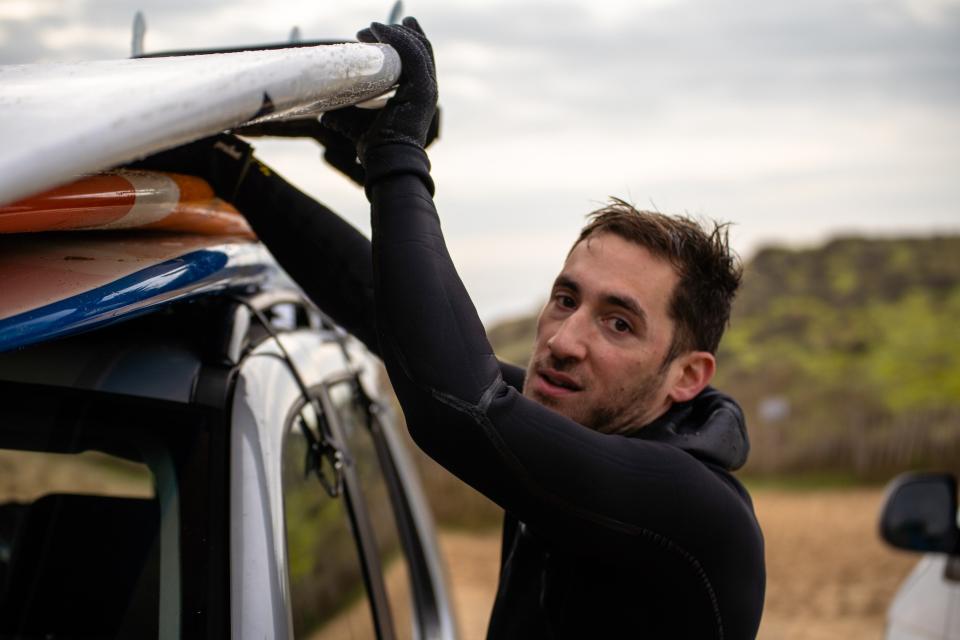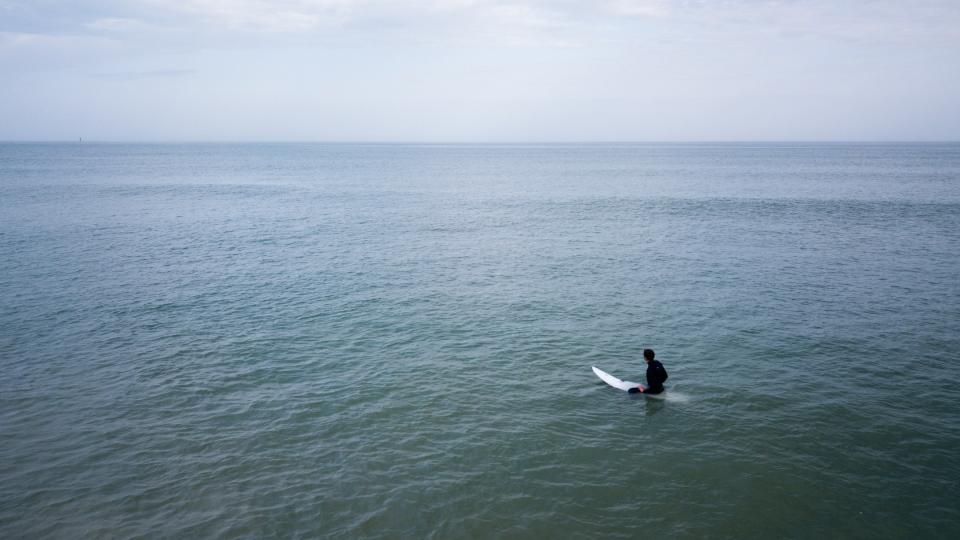Atlein Designer Antonin Tron Reflects on Life During the Crisis—And How to Make It Better Afterwards
Currently, I am on what was meant to be a vacation from Paris and my label, Atlein, in Ile de Ré—to go to a place I love most and to surf for 10 days. We have now been here since the eighth of March because the French government announced the lockdown (which I think should have been announced earlier). Neither my partner, Gabriele, nor I can go back home to Paris. We are confined with my parents in our family house.
The coronavirus started to make an impact before Fashion Week had even begun. A lot of buyers had already left or weren’t going to come from Asia; it’s not a big market for us, but we felt their absence. And the people in Paris were preoccupied; in that moment, fashion was the last thing on their minds. So many stores are not buying autumn, stores aren’t taking spring, and all the factories I work with in France and Italy are closed. It’s a devastating tsunami for our company.
We had to transform part of the house into a logistic center, as everything is shut. We are all packing boxes and trying to get them to be picked up by stores. (Some of them won’t, and it’s a disaster.) I don’t know how we will make it, but we are fighters. This is what it takes to have your own business. You need to be fearless. Get back in the ring every day.

Yet, for me, I can’t help but think that a lot of positive things are going to come out of this. I understand I am saying this from a privileged point of view. I think of all the people for whom confinement is literally hell or impossible—countries where the impact will be devastation and families who grieve their loved ones. Still, while I am not a mystical person, this could be our second chance. We are all being asked to refocus. Nature is asking us to stop and reconsider. The political situation is profoundly killing everything. We need to change now, and we can. This is what this crisis is showing. We can actually stop everything and rethink, recreate, and do it better.
I recently saw the International Space Station in the sky passing over France. It felt like a shiny beacon in the evening light. We have the resources to build a better and fairer world. This life moment for us—I don’t know what it’s going to mean, what we will do, how we will make it, but I think it will take off some pressure. We are seeing all the flaws in the system—for instance, we badly need to invest in the health system because it is going to be the ill and the poor who suffer the most.
The hospital crisis is a big deal in France! And we are talking about a country that has one of the best health care systems in the world. We can’t treat the health system like an economic system. We need to decentralize, refocus, regenerate, defend, protect, and redistribute. Globalization is showing its limits. It’s a systemic change that we need. I am privileged; I am one of the ones who gets to do what he wants and be creative. But today you can’t ignore the immense inequalities in our world and be fine with it.
I went into the attic of our house here and found my old Stockman dummy from school and some old fabrics and started draping. I have six weeks where I am just going to be here. That pushes you to go to the core of your creativity. I can’t go back to the office, and I can’t make anything that would help here—all I can do is start draping again. I’ve been reading a lot about A.I. and how that is going to replace so much of what we do. So many jobs will disappear. New ones will be created, of course, but creativity is a core thing.
So this is what I do: I am a dressmaker, not an artist. I drape, and I start thinking about shapes and constructions. It makes me feel calm and peaceful to spend time manipulating fabric and to create something with my own hands. And there’s also this idea about slow process. Designers don’t really drape anymore—there is no time, and it is so time-consuming. It’s the hand and the fabric and nothing in between—a very physical process. Being in the atelier, going to the factory, talking to people there: It’s the hand and the fabric—nothing in between.
That is what I have always loved, even when I was working in big houses: the people in the ateliers, the human connection. At Atlein, we took a strong statement from the start: working locally, the artisanal way of making something. It is almost impossible financially to work “made in France,” but we did it from the start. The craft that is needed to produce something; you can’t be disconnected. You’ve got to be talking to the woman behind the sewing machine. You can’t be so distanced from the hand that makes it. There is something noble about fashion—that connection with the artisan and the making of it. That’s the beauty of it.
At our factories in the east of France, it’s complicated there. The area is one of the core areas of the pandemic in France. For now, the factory is closed. It is such an amazing factory. I have known them for years. The women can take some of their work home if they need to. It’s a great social program. Social responsibility is essential for me. It’s really about seeing that everyone in the chain of production gets treated and paid fairly. Everyone is talking about sustainability, but what is important to me is to create a virtuous and respectful economic system where independent businesses can survive and work locally. When you hear about how cotton is organic, but a lot of it is picked by children in Bangladesh—that’s just greenwashing.

I am in a place [Ile de Ré] that is so special to me. I am extremely lucky. The brand is called Atlein because of the Atlantic Ocean; the name came to me on this beach. I love it here because, before confinement, I used to go surfing on these beautiful spots. I stayed out there until nightfall, just catching waves. It’s like a trance. It’s like a remembrance of a primitive state, harmony with nature. I would chat with other surfers, drink a beer in the parking lot, then drive back in my wetsuit, barefoot. There is a whole sensuality in the after-surf. Like getting out of the wetsuit. The soreness. The salt in your hair. I think it influences the way I make clothes.
I think we are in a very hopeful moment. I think the climate crisis is, as we know by now, not just a climate crisis: It’s a sociopolitical and environmental crisis. We talk about a tipping point, and we are there now. What will we do with what little time we have left? This will make the difference forever (on a human scale). How do you create in such a context? It’s always a tough question. But to me, fashion can be culture, know-how, a positive lifestyle, and objects that bring joy and pleasure.
Fashion, as we know, is built on a capitalist system, and that system is showing its limits. It has brought a lot of good things but also at great costs, and now we need to create a new narrative. It’s not about hating money and social differences; it’s about redistributing it so that everyone has their place in the sun.
Originally Appeared on Vogue

